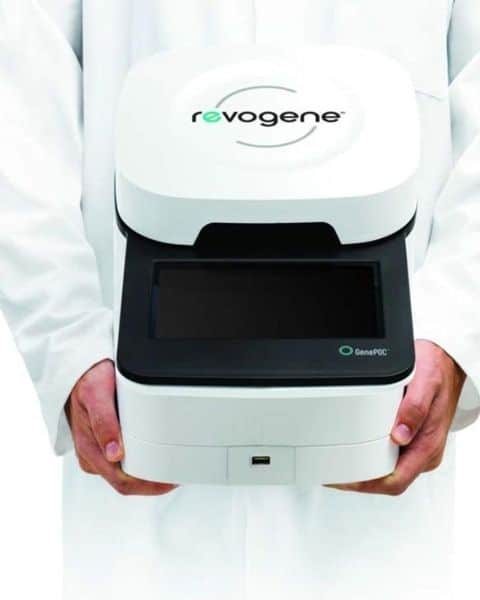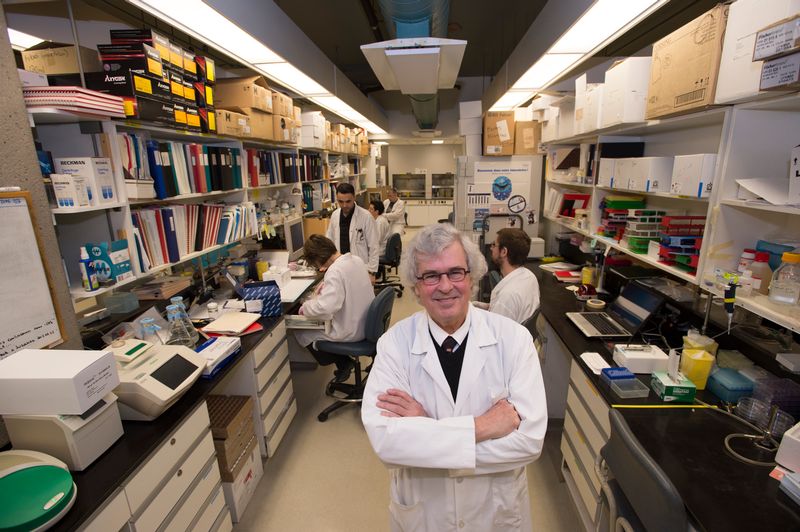New genomics-based tool will be capable of identifying microbes in only 60 minutes,
leading to faster treatment for infected patients.
Picture yourself at the ER with severe intestinal problems. You think it might be a case of the stomach flu that just won’t go away. The triage nurse sends you for a stool sample test and, within an hour, you find out you have a C. difficile infection. Time is of the essence here: C. difficile reproduces quickly in the intestines and comes with a risk of contamination. From there, you immediately see the doctor, who starts you on the right antibiotics and places you in isolation. Sound too good to be true?
Not for Michel G. Bergeron, researcher and founder of the Infectious Diseases ResearchCentre at the CHU de Québec-Université Laval. According to this eminent infectious diseases specialist, the future of medicine lies in the fast and accurate diagnosis of pathogens to ensure their targeted treatment and avoid the unnecessary prescribing of antibiotics. To achieve this medical ideal, he and his colleagues have developed the Revogene diagnostic instrument with its molecular tests. This portable lab, dubbed the “Nespresso of genomics” by the researcher, is no bigger than a coffeemaker and is expected to revolutionize infection screening in hospitals, clinics, pharmacies, CLSCs and schools.
Results in less than an hour
The compact, fully automated and easy-to-use Revogene instrument is marketed by GenePOC, a company started by Dr. Bergeron. “You simply insert a blood, saliva or stool sample in one of the compartments of the machine and it then prepares, detects, amplifies and analyses the microbial DNA that might be present,” he explained. This process is far easier than bacterial cultures, the standard technique used since the days of Louis Pasteur to screen for infections. With this method, it can take 2 to 3 days to get results that are, at times, not conclusive. The new device can also handle eight different samples at a time.
At the moment, two diagnostic tests have been developed by the researcher and his team. The first detects genes that code for Clostridium difficile toxins in stool samples. “This bacterium is the leading cause of infectious diarrhea in health care facilities. It kills 30,000 Americans and 3,000 Canadians every year. Identifying it quickly is crucial when it comes to preventing epidemics,” he said. The second test screens for Group B Streptococcus (GBS) before childbirth. Moms-to-be are generally tested for GBS around 35-37 weeks of pregnancy, but 20 to 30 percent of them are still infected at the time of labour. With the new device, doctors in the delivery room will know in 35 to 45 minutes whether the mother carries GBS. “If the mother tests positive, we give her penicillin to make sure her baby does not contract meningitis or pneumonia during the delivery,” he explained.


The road to innovation
The idea behind Revogene came to Dr. Bergeron back in 1985: “I woke up one day thinking that we really needed to improve the way we detect infections in order to reduce the unnecessary use of antibiotics and fight the problem of resistant bacteria.” According to the United Nations, the resistance of bacteria to antibiotics is a global crisis that is compromising our ability to treat common infections. Part of the problem is that over 50 percent of antibiotics are used to no avail to treat viral infections, whose symptoms resemble those of a bacterial infection.
In light of advances in genetics, then in genomics, Dr. Bergeron started to think that perhaps it would be possible to identify the types of pathogen (virus or bacteria) quickly through their DNA/RNA. In the case of bacteria, he also believed it possible to determine the genes involved in their resistance so that the right antibiotic could be prescribed. “To do so, we improved and adapted the DNA amplification method, known as Polymerase Chain Reaction (PCR), to obtain a diagnosis in real time. The technique can recognize, then multiply thousands of times over the specific DNA sequence of microbes. By better preparing samples, we were able to reduce the time it takes to identify the DNA of a microbe from several hours to just one,” he explained.
After creating Infectio Diagnostic in 1995 to leverage this expertise, Dr. Bergeron drew on his entrepreneurial skills once again in 2008 to launch GenePOC and commercialize Revogene. “This year GenePOC is expected to launch a screening test for Group A Streptococcus, commonly known as flesh-eating bacteria,” he announced. Once all the tests that are developed or currently in production have been approved in Canada, the United States and Europe, Revogene should hit medical clinics and, as Dr. Bergeron hopes, come to a pharmacy near you.
After creating Infectio Diagnostic in 1995 to leverage this expertise, Dr. Bergeron drew on his entrepreneurial skills once again in 2008 to launch GenePOC and commercialize Revogene. “This year GenePOC is expected to launch a screening test for Group A Streptococcus, commonly known as flesh-eating bacteria,” he announced. Once all the tests that are developed or currently in production have been approved in Canada, the United States and Europe, Revogene should hit medical clinics and, as Dr. Bergeron hopes, come to a pharmacy near you.

